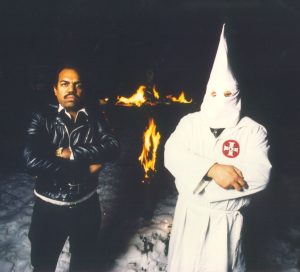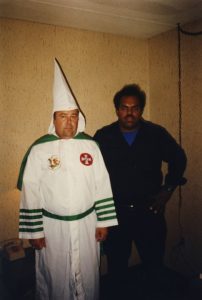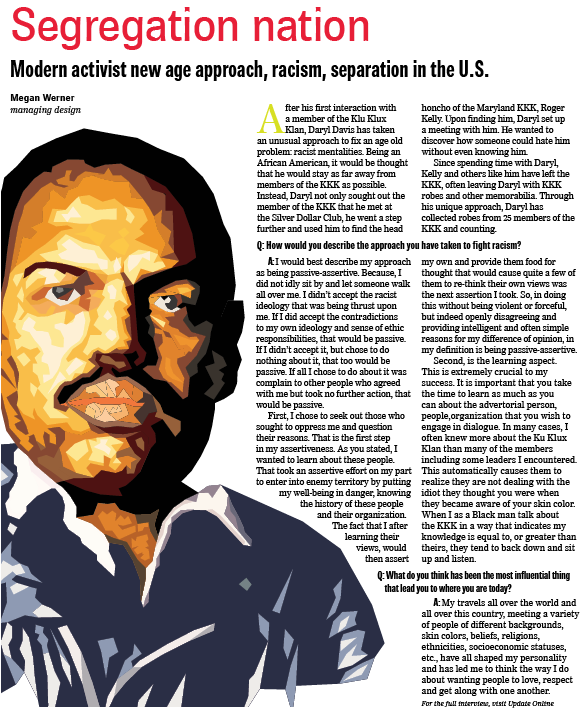
1. What do you believe is the status of racism in the US?
I believe that racism is at a high in our country. We see it in the way Blacks are treated by police. We see it in the way Muslims are regarded, or any Middle Easterner. We see it in the way we treat Hispanics and Latinos from Mexico and South America. We hear it in the speeches given by the very people who are running for the highest office in our land. We see it in the support of the Confederate Flag in a country in which the Confederacy lost the Civil War in 1865, but yet, the United States still allows the enemy’s flag to fly. What is “United” about that???
2. Do you believe notable progress has been made by our country as a whole to help stop racism in the US?
Notable progress has been made to reduce racism, but NO, notable progress by our to country to stop racism, has NOT been made. Too much time is spent with opposite sides on the racism issue talking to the media and not to each other. My success lies in the fact that I will sit down and have a conversation with those who at the most hate me and would like to see me dead, or at the least those who disagree with me. There is a lot of hypocrisy from those who claim they are anti-racist, when they won’t even take the time to speak the those whom they oppose, because of a differing views. Essentially, they are behaving like the exact prejudicial manner they are opposing.
3. What have you been doing to help fight racism?
I have been doing exactly what most people have not. I have been inviting those who oppose or even hate me, to the table for conversation. As a result, I have had some amazing and successful results.
4. Do you believe enough is being done to help fight racism?

Again, NO, I do not. Here is just one example: Prior to 9/11, our nation was very divided, along racial lines, socio-economic lines, political party affiliations, and other differences. When we were attacked, ALL Americans put those differences aside and pulled together and we became ONE. At that point, we truly became the “UNITED” States of America. However, as time moved forward and 9/11 was becoming smaller in our rearview mirror, we drifted back to our previous status of discriminating against one another. In other words, we didn’t learn anything and we had a relapse. Often times with medical conditions such as pneumonia, weight gain, and cancer, the relapse is worse than the original condition. We are now right back to where we were pre-9/11. This is because we did not have a mechanism in place to keep us together. We should have learned that lesson in order to avoid a repeat. Still to this day, we don’t really have mechanisms in place to keep us together and keep the lines of communication open between people who may disagree with one another. There is nothing wrong with disagreeing, but we should be able to discuss our differing viewpoints with each other instead of only discussing them with news media outlets. I don’t have a problem with people talking to CNN, MSNBC, FOX or any other news agency, I do it myself. But, unlike many other people, I will also sit down off-camera and have discussions with my opponents and adversaries.
5. How would you describe the approach you have taken to fight racism?
6. What has influenced you the most to take this approach?
I am answering questions 5 & 6 with this answer: I would best describe my approach as being passive-assertive (unlike passive-aggressive which I’ll explain in a moment). Because, I did not idly sit by and let someone walk all over me. I didn’t accept the racist ideology that was being thrust upon me. If I did accept the contradictions to my own ideology and sense of ethic responsibilities, that would be passive. If I didn’t accept it, but chose to do nothing about it, that too would be passive. If all I chose to do about it was complain to other people who agreed with me but took no further action, that would be passive.
First, I chose to seek out those who sought to oppress me and question their reasons. That is the first step in my assertiveness. As you stated, I wanted to learn about these people. That took an assertive effort on my part to enter into enemy territory by putting my well – being in danger, knowing the history of these people and their organization. The fact that I, after learning their views, would then assert my own and provide them food for thought that would cause quite a few of them to re-think their own views was the next assertion I took. So, in doing this without being violent or forceful, but indeed openly disagreeing and providing intelligent and often simple reasons for my difference of opinion, in my definition is being passive-assertive. Although the term “passive-aggressive” is often used, I think in this case it would be a symbiotic dichotomy. The term aggressive implies the presence of some type of force. It comes from the word “aggress,” which is a very close cousin to the word “aggravate.” If you are aggressive with someone, you will no doubt aggravate them and the likelihood of any positive results will probably not be forthcoming. So, in my opinion “passive- aggressive” is a misnomer and can’t have two opposites working hand-in-hand.
Second, is the learning aspect. This is extremely crucial to my success. It is important that you take the time to learn as much as you can about the adversarial person, people, organization that you wish to engage in dialogue. In many cases, I often knew more about the Ku Klux Klan than many of the members including some leaders I encountered. This automatically causes them to realize they are not dealing with the idiot they thought you were when they became aware of your skin color. Similarly, because for no other reason than the fact that you are a woman, you are a target of car dealers and auto repair garages. Many of these people pre-judge your intelligence the second they see you walk through their door. Thus the word “prejudice.” They automatically think you know nothing about cars and they will sell you a car at the most expensive price and try to make you believe they are giving you the deal of the millennium. They would never attempt to try this if a male walked through the door, because it is already assumed that men know about cars. The same thing applies when a woman goes to get a simple problem on her car fixed. She often ends up paying for all kinds of things that don’t need to be fixed but somehow the mechanic has convinced her they are all connected. (Because your windshield wipers don’t work, you need to buy 4 new tires and that will fix the problem). This is why women are often told, “Take a man with you when you go to buy a car or you go to have one fixed.” So the best strategy for leveling the playing field is to learn more about your subject and the arena in which he exists than he knows. As soon as you walk into the dealership or mechanic and talk like you know as much about cars as they do, you suddenly command a whole lot more respect. Similarly, when I as a Black man talk about the KKK in a way that indicates my knowledge is equal to, or greater than theirs, they tend to back down and sit up and listen.
7. Do you have anyone in your life that has influenced you to work like this?
8. Is there anyone in history that has influenced you to work like this?
“I am answering both questions 7 & 8 with this answer: I have quite a few role models. Here are some of them.
- My Parents: For giving me the exposure of the world at an early age and for imparting to me, their infinite wisdom of the secret of success. To respect others as you would have them respect you; to learn as much you can from those who are different from you and to welcome that difference as you would want your difference to be welcomed.
- The Reverend, Doctor, Martin Luther King, Jr.: For all he did to bring all races together. He is truly someone who committed and gave his life to that cause. For making my world a better place for me than my parents and grandparents had before me. And for teaching me that there is still a lot of work to be done and the level of discipline which must be executed to make that progress. He is my prime example of leadership. He taught followers for years to come to be leaders. Even after his death, leaders who weren’t even born during his time have acknowledged his influence.
- Rosa Parks: In 1955, women NEVER spoke up against men. When they did, they were often severely punished and had no recourse. All the courts were run by men. The judges were men. Laws were written and interpreted by men. There were no battered women’s shelters or a lot of women’s rights groups.. Women were pretty much at the mercy of men in a male chauvinistic society. Not only did Ms. Parks speak up against a man, she was a BLACK woman who spoke up against a WHITE man!!! That was pretty much unheard of, if you wanted to keep living. Not only did Ms. Parks cause the Montgomery Alabama City Bus Lines to change their policy and allow Blacks to sit wherever they wanted, bus companies all over the country changed their policies as well as a result of this one woman’s action and the boycott led my MLK that followed. So, she is not only a Civil Rights role model in the racial arena, she is also a very strong voice for women and influenced them to stand up to men who abuse and discriminate against them.
- Chuck Berry: For inventing Rock’n’Roll which cause young White and Black kids who were segregated by their color, to knock down the ropes designating their seating sections and boogie woogie and dance in the aisles together. This was the first time in the history of American music, this had happened. It was that Chuck Berry’s Rock’n’Roll music that caused it. Just like his song says,”ROCK AND ROLL MUSIC” by Chuck Berry – 1957’Just let me hear some of that Rock’n’Roll music,Any ol’ way you choose it,It’s gotta backbeat you can’t lose it,Any ol’ time you use it,It’s gotta be Rock’n’Roll music,If you wanna dance with me.’
- Elvis Presley: For defying the Establishment (the White power structure) by embracing Black music and spreading it nationwide, thus opening the doors for many other Black artists at a time when Rock’n’Roll was being shunned by adults and called “race music,” “jungle music,”and “nigger bop.”
- Muhammad Ali: For standing up for his righteous beliefs despite the consequences he had to pay. He refused to go fight in the Vietnam war after being drafted, saying that no Vietnamese person had ever called him “nigger” and he questioned why should he go thousands of miles away from home and murder other people for this country, only to \ return and be treated like a second class citizen himself by his own fellow countrymen. He was told if he did not obey a government order to go, he would face jail time. He said “So what? I’ll go to jail. We’ve [Blacks] have been in jail in this country for 400 years already.” Muhammad Ali was not a draft dodger or a coward. He simply told it like it was. Why should he or any Black American go and kill other people in another country to ensure their freedom and equal rights, when he and his race were not granted the same at home?
- The Dixie Chicks: For speaking their mind about President Bush. They were chastised, dropped from radio play lists, declared unpatriotic, and there were Dixie Chick CD burning parties. Over time, more people have woken up and now the Dixie Chicks are back on top as demonstrated with their winning a Grammy.

9. What moment in your career as an activists has had the largest negative impact on you?
I would have to say meeting with both Black and White Supremacists who just don’t get it and who want to engage in violence with me. There have been times I have had to put someone in the emergency room and times I have had to put someone in jail.
10. What is the driving force behind what you are doing?
Seeing the light bulb pop on in the heads of those people who have changed for the better and knowing that they too, will make a positive difference in the lives of others.
11. What kind of an impact do you hope to make?
I have already made an impact and hope to continue doing so. I have influenced certain people’s decisions to leave the Ku Klux Klan and neo-Nazi groups and this has reduced the amount of racism in the society in which I live. It has not eradicated it completely, but things happen in steps and I see the right steps being taken.
12. Do you recommend other people try to take the approach you are towards racism?
It works for me and I strongly advocate and endorse it. But, I would also say, have your act together and know exactly what you are talking about and how to respectfully handle various personalities without patronizing their beliefs, and yet being able to assert your own in a non-offensive and intelligent, influential manner.
13. Do you apply this approach to your daily life?
As much as I can.

14. What was your reaction when the Maryland KKK fell?
I was very happy and surprised. That does not mean that there are no more racists in Maryland. There are plenty of racists in Maryland. It means that there is no more organized racism in Maryland and I’m happy to have contributed to that effect that. Hopefully, the police will take actions to get rid of their racist officers on their police forces in Maryland.
15. How many robes have you collected?
I haven’t counted lately, but I think there might be 25 or 26. I am getting another one shortly. However, I have a ton of other KKK items given to me by those who quit, which I keep locked up off site.

16. Approximately how many functions/rallies/assemblies for the KKK have you attended?
Too many to count. I’ve been doing this over 30 years. But, if anyone attends just one KKK function/rally/ assembly, that’s one too many.
17. Have you been asked to speak anywhere about your platform and what you are doing? If so, how many times and where?
I speak all the time, all over this country and overseas as well. I give 50 to 60 lectures per year and have been doing so for a couple decades.
18. What do you think has been the most important/influential thing that lead you to where you are today?
My travels all over the world and all over this country, meeting a variety of people of different backgrounds, skin colors, beliefs, religions, ethnicities, socio-economic statuses, etc., have all shaped my personality and has led me to think the way I do about wanting people to love, respect and get along with one another.
19. Have you ever received threats from people telling you to stop doing what you are? If so, from who and approximately how many?
Yes, every once in a while I will receive threats in person and anonymously, and unfortunately, there have been times when I have had to even resort to violence in the interest of self-preservation. These threats have come from both Black and White supremacists.
By: Megan Werner


